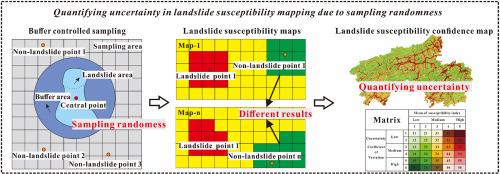量化采样随机性导致的滑坡易发性绘图的不确定性
IF 4.2
1区 地球科学
Q1 GEOSCIENCES, MULTIDISCIPLINARY
International journal of disaster risk reduction
Pub Date : 2024-11-01
DOI:10.1016/j.ijdrr.2024.104966
引用次数: 0
摘要
滑坡和非滑坡样本的质量在使用机器学习算法生成的滑坡易感性图(LSM)中起着至关重要的作用。然而,收集非滑坡样本所产生的不确定性会严重影响这些地图的可靠性。缓冲控制采样 (BCS) 等现有方法往往无法充分解决这一问题。本研究旨在通过采用蒙特卡罗模拟结合 BCS 来量化与非滑坡取样相关的不确定性,并提高 LSM 的准确性,从而填补这一空白。通过结合滑坡易感性置信度图 (LSCM),提出了一个新颖的框架,以解决基于 BCS 的 LSM 固有的不确定性。该框架对 LSM 中的不一致性进行了评估,结果表明,由于非滑坡样本选择的不同,同一模型生成的地图可能在 30% 以上的区域存在差异。所提出的方法优于传统方法,能正确划分滑坡易发区,尤其是在低易发区和极低易发区,同时还能提供更可靠的不确定性量化。这些发现强调了传统 LSM 方法的局限性,并证明 LSCM 为滑坡灾害评估提供了更强大的工具。该框架提高了易感性绘图的精确度,并为更好地减轻风险和备灾提供了重要见解。本文章由计算机程序翻译,如有差异,请以英文原文为准。

Quantifying uncertainty in landslide susceptibility mapping due to sampling randomness
The quality of landslide and non-landslide samples plays a crucial role in landslide susceptibility maps (LSMs) generated using machine learning algorithms. However, uncertainties arising from the collection of non-landslide samples can significantly compromise the reliability of these maps. Current methods, such as buffer-controlled sampling (BCS), often fail to address this issue adequately. This study aims to fill that gap by employing Monte Carlo simulations combined with BCS to quantify the uncertainties associated with non-landslide sampling and improve the accuracy of LSMs. A novel framework is proposed by incorporating landslide susceptibility confidence maps (LSCMs) to address the inherent uncertainty in BCS-based LSMs. The framework evaluates inconsistencies in LSMs, showing that maps generated by the same model may differ in over 30 % of the area due to variations in selection of non-landslide samples. The proposed approach outperforms traditional methods by correctly classifying landslide-prone areas, particularly in low and very low susceptibility zones, while providing a more reliable quantification of uncertainty. These findings underscore the limitations of traditional LSM methods and demonstrate that LSCMs offer a more robust tool for landslide hazard assessment. The framework enhances the precision of susceptibility mapping and provides critical insights for better risk mitigation and disaster preparedness.
求助全文
通过发布文献求助,成功后即可免费获取论文全文。
去求助
来源期刊

International journal of disaster risk reduction
GEOSCIENCES, MULTIDISCIPLINARYMETEOROLOGY-METEOROLOGY & ATMOSPHERIC SCIENCES
CiteScore
8.70
自引率
18.00%
发文量
688
审稿时长
79 days
期刊介绍:
The International Journal of Disaster Risk Reduction (IJDRR) is the journal for researchers, policymakers and practitioners across diverse disciplines: earth sciences and their implications; environmental sciences; engineering; urban studies; geography; and the social sciences. IJDRR publishes fundamental and applied research, critical reviews, policy papers and case studies with a particular focus on multi-disciplinary research that aims to reduce the impact of natural, technological, social and intentional disasters. IJDRR stimulates exchange of ideas and knowledge transfer on disaster research, mitigation, adaptation, prevention and risk reduction at all geographical scales: local, national and international.
Key topics:-
-multifaceted disaster and cascading disasters
-the development of disaster risk reduction strategies and techniques
-discussion and development of effective warning and educational systems for risk management at all levels
-disasters associated with climate change
-vulnerability analysis and vulnerability trends
-emerging risks
-resilience against disasters.
The journal particularly encourages papers that approach risk from a multi-disciplinary perspective.
 求助内容:
求助内容: 应助结果提醒方式:
应助结果提醒方式:


